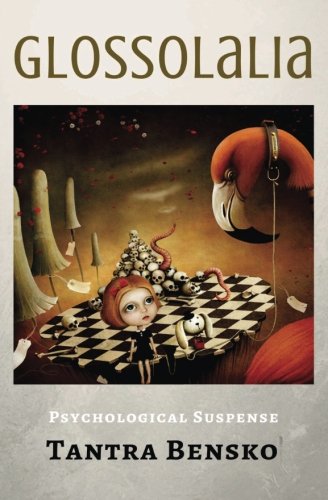Reviewed by Harvey Tomlinson
Agents of the Nevermind (Glossolalia, Remember to Recycle, Bravo)
by Tantra Bensko
Insubordinate Books
247 pp, $16.00. 2016-2018. ISBN 978-0692551523
In Glossolalia, the first novel of Tantra Bensko’s Nevermind series, an amnesiac working for a pesticide company investigates a missing batch of chemicals only to become enmeshed in a nightmarish conspiracy. A shadowy US government intelligence agency called Nevermind turns out to be utilizing a network which encompasses Hollywood, public libraries, a Pentecostal church and the CIA to manipulate the population into support of foreign wars and interventions. Most terrifying of all is Nancy’s realization that she has a hidden identity as an assassin, committing atrocities while put in a hypnotic trance by the Nevermind organization.
The notion that bourgeois life is a comforting illusion is hardly new but Bensko’s Nevermind novels (three are now available: Glossolalia, Remember to Recycle, and Bravo) are a notably idiosyncratic and feminist entry in a tradition whose obvious referents include Philips K Dick, William Burroughs and David Lynch. Bensko—a California based artist and writer who once palled around with the likes of Alan Ginsberg—has an extraordinary ability to interrogate the nature of reality, to make you doubt all the things you had previously taken for granted.
In her dystopic twist on our divided present, following the accession of US President Planda in the 1980s, the Nevermind agency increases its control using a wide range of perception management techniques from truth telling drugs to trance states and mind control. The Nevermind’s manipulative techniques may draw on knowledge of esoteric traditions such as the Ecochian language of psycho-suggestion, but the objectives are only too familiar to students of US and British foreign policy: ‘The powers that be wanted to lay claim to different countries… they created coups and installed puppet dictators.’
Bensko’s deep state scenario resonates with what we know about the invasive ways of the American intelligence establishment, from the famous exploding cigars and poisoned wetsuits the CIA devised as ways to assassinate Fidel Castro, to the Dark Ops directed at civil rights campaigners like Martin Luther King. The novels also channels the fractiousness of America in the Trump era and there is even a shady preacher man campaigning for a ‘Republican presidential candidate’.
The books really triumph, though, in creating a counter-history which fuses the technocratic mastery of the Nevermind agents with a tradition of anti-rationalism, spiritualism and exoticism that runs through the project of western modernity, a swampy seam of conspiracy theories, UFOs, Spiritualism, Theosophy, and pseudo-science. The struggle over invented mythologies has an Orwellian dimension as the sinister Nevermind organization manipulates occult history to justify war.
This sounds farfetched, but Bensko contextualizes her counter history within a long tradition of the occult obsessions of western intelligence agencies, showing how this preoccupation connects Walsingham in the age of Elizabeth 1 through the Great Game manipulation of Atlantean legends, and the intelligence connections of Russian occultist Madame Blavatsky, the co-founder of Theosophy. Occultists and intelligence officers are, after all, both in the business of deciphering codes. Walsingham, Elizabeth’s spymaster, recruited John Dee, a famous Welsh magician, who fed him supernatural intelligence about the Spanish threat
Bensko’s fascination with the murky boundary between science and pseudo-science is informed by her outré personal biography. Her father worked on the Manhattan Project, and introduced his daughter to associates engaged in research in areas of pseudo- science such as mind control, hypnotism, telepathy, teleportation and so on. These included techniques learned by the CIA from some of the more than 1600 Nazis s brought to the U.S. after World War Two as part of Project Paperclip, a secret program of the Joint Intelligence Objectives Agency (JIOA) to gain military advantage in the Cold War.
Bensko’s sensitivity to the presence of the irrational beneath the surface of American modernity also reflect the influence of her southern Alabama upbringing, where she was exposed to evangelical traditions, including snake handling cults. While an affirmed atheist, her artistic vocation led her to experiment with transcendental states, practicing for some time as a Tantric guru, and spending months living in a remote mountain cave. Her novels explore themes including mind control, multiple identities, dimensions, environmental desecration.
Bensko’s southern upbringing sings through her zesty, humorous prose, which while often poetic contrasts refreshingly with the earnestness of many conceptual fiction writers. The characters are satisfyingly complex and disproportionately female. Nancy, central figure of the first two titles Glossolalia and Remember to Recycle, is vulnerable but smart and tough, a strong protagonist for our #MeToo times. The friendships, lusts and sex lives of Bensko’s heroines play an important role too in each novel. Remember to Recycle features a hilarious suppositious relationship between Nancy and a mysterious recycling man who goes through her trash and falls in love with the way she removes labels from jars
The sheer fertility of Bensko’s imagination keeps us turning the pages, drawn into her questioning of the construction of the discourses of science and pseudo-science, the way that many of the ‘scientific’ discourses we elevate – neoliberal economics for example – are founded on paralogical assumptions. The nefarious agenda of President Planda also reminds us how many leaders apply the rational instruments of technocratic politics in the service of fallacious ideas such as nativism. In other words, Bensko’s alternative take on our world feels surprisingly and urgently relevant.
The Nevermind series has gained a growing following, garnering an Amazon gold star for Glossolalia, and is deserving of further recognition. Bensko, currently recovering from health issues, still hopes to publish four more Nevermind titles. Here’s hoping for more entries in the series soon.